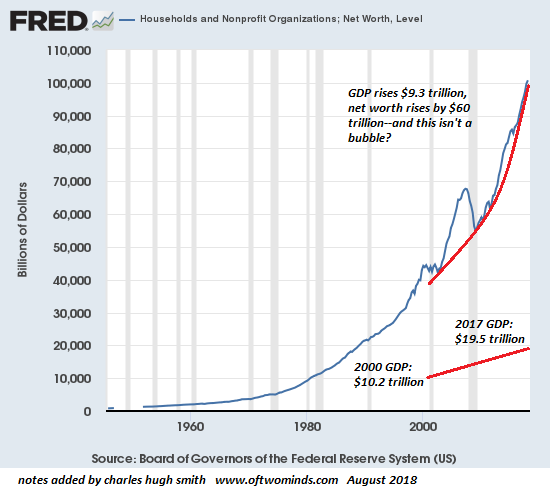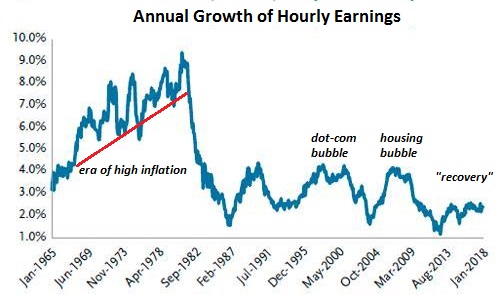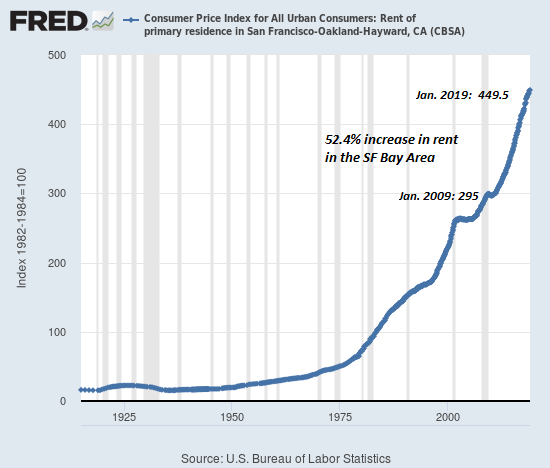The Fed is the mortal enemy of the young generations, and thus of the nation itself.
“The wealth effect” generated by rising stock and housing prices has long been a core goal of the Federal Reserve and other central banks. As Lance Roberts noted in his recent commentary
So, The Fed Doesn’t Target The Market, Eh?(Zero Hedge), Ben Bernanke added a “third mandate” to the Fed – the creation of the “wealth effect”–in 2010, the reasoning being that higher asset prices “will boost consumer wealth and help increase confidence” which will then lead to higher spending and all the wonderfulness of endless economic expansion.
But as Chris Hamilton explains in his recent essay Economic Doom Loop Well Underway, “the wealth effect” has enriched the already rich at the expense of the young who didn’t get the opportunity to buy the assets the Fed has pushed to the moon at pre-bubble prices. That privilege was largely reserved for those who bought a decade or two ago, before the Fed made boosting asset prices the implicit goal of all its policies.
Take a look at the chart of household net worth below. Household worth has soared from around $40 trillion in 2000 to $100 trillion in 2018–a gain of $60 trillion while the economy grew at a much more modest pace. Household net worth has leaped from $55 trillion in 2010 to $100 trillion in 2018–$45 trillion in gains for those who already owned stocks and houses.
As Chris observed,“non-discretionary items like homes, rent, education, healthcare, insurance, childcare, etc. are skyrocketing versus wages.” This is visible in the second chart of wage growth, which has hobbled along at 2% or 3% while stocks and housing have doubled or tripled.
The wealth effect has benefited the haves at the expense of the have-nots, the young who can no longer afford to buy homes or start families unless Mom and Dad provide the capital.
| The nation is losing an entire generation as a result of the Fed’s cargo-cult like obsession with boosting the wealth of the haves. The wealth effect is the most generationally lopsided policy possible, the equivalent of a “tax on youth.
“Sure, a few lucky folks got a down payment from the parents to buy a home in bubblicious areas like Seattle, Portland or Brooklyn in the narrow window between 2009 and 2012, but what percentage of Millennials managed to buy in this brief window before the Fed inflated Housing Bubble #2? Not many.
How many Millennials cobbled together a stock portfolio (or secured stock options) before the S&P 500 shot up from 700 to 2,800? Not many. |
Households and Nonprofit Organizations 1960-2018 - Click to enlarge |
| How many Millennials have seen their earned income match or exceed the sharp increases in rent, college tuition and healthcare? Not many. |
Annual Growth of Hourly Earnings 1965-2018 - Click to enlarge |
| Rent has climbed by between 30% and 50% since 2009: |
Consumer Price Index for All Urban Consumers 1925-2018 - Click to enlarge |
My new book is The Adventures of the Consulting Philosopher: The Disappearance of Drake. For more, please visit the
book's website.
Full story here
Are you the author?
At readers' request, I've prepared a biography. I am not confident this is the right length or has the desired information; the whole project veers uncomfortably close to PR. On the other hand, who wants to read a boring bio? I am reminded of the "Peanuts" comic character Lucy, who once issued this terse biographical summary: "A man was born, he lived, he died." All undoubtedly true, but somewhat lacking in narrative.
Previous post
See more for 5.) Charles Hugh Smith
Next post
Tags:
newsletter

















